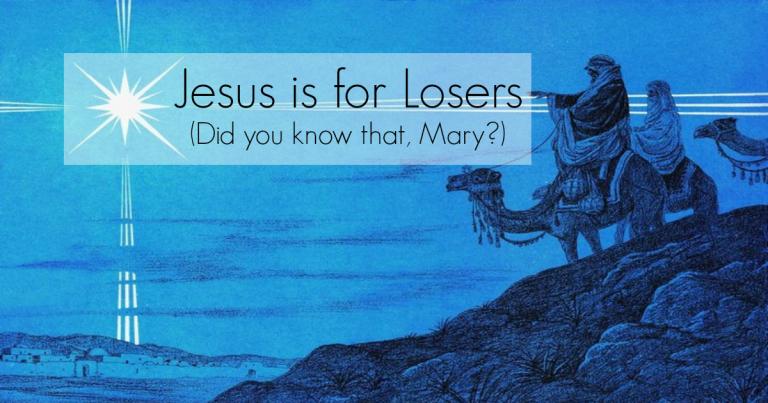
If you could start your life over, and you got to choose your parents, what would they be like? I’ve always been a little sore at my parents for not being taller. When I was a teenager, my goal was to play in the NBA and at 5’10” (and not particularly fast or gifted with ‘ups’) that was not going to happen.
Maybe you wished your parents had had smaller ears to pass on to you, or that they had had more money to pass on. Maybe you just wished your parents had stayed together, or had wanted you more, or that neither of them had an addictive personality.
But, we don’t get to pick our parents, do we? It’s one of the interesting things about God that He starts us out in life by saying, “Here, your physical, emotional, and spiritual well-being are going to be tied to these two people in some way for the rest of your life.” I think, for a lot of teenagers, that’s one of the first crises of faith: “God, of all the parents in the world, you gave me these people? Whatever.”
But, there was one person who got to pick his parents. Jesus got to choose where and to whom He was born. Now, it was a somewhat narrow pool; in order to fulfill the Old Testament, it had to be a Jewish family. But, of all the Jewish parents available, He chose a poor carpenter and a teenage girl who lived in a backwater town as part of an occupied nation of people. They weren’t even married!
Isn’t that interesting? I think sometimes we have such a polished view of Christmas- like a Thomas Kincade painting. You see the sweet baby Jesus and his angelic parents and if you listen closely, you can hear the cattle softly lowing. But the first Christmas was not like that at all.
I think one of the best things we can do at Christmastime is to knock the shine off of the Christmas story. One of my favorite new Christmas songs was written by a singer-songwriter named Andrew Peterson. It’s called “Labor of Love”:
“It was not a silent night, there was blood on the ground,
You could hear a woman cry, in the alleyway that night, on the streets of David’s town.
And the stable was not clean, and the cobblestones were cold,
And little Mary full of grace, with the tears upon her face,
Had no mother’s hand to hold…”
Jesus’ birth was not a pretty site. And the woman He chose to carry Him must have been terrified. But, we learn in the gospel of Luke that Mary was actually quite a remarkable young woman. Luke 1 records her words that have become known as “Mary’s Song,” and it’s sometimes called “The Magnificat,” which is a Latin translation of the first line, “My soul magnifies the Lord.” It’s one of the most sung pieces of Scripture in church history, everyone from JS Bach to the modern composer John Rutter have put it to music, and it’s pretty profound.
It comes during the second of two significant events in Mary’s life. The first, of course, is when the angel Gabriel comes to Mary and tells her that she is going to have a child, through the work of the Holy Spirit, and that He is going to reign on King David’s throne forever. That’s something that doesn’t happen every day.
The second event is when Mary goes to visit her cousin Elizabeth, who is pregnant with John the Baptist- and Elizabeth tells her she is blessed because she is the mother of the Lord and because she believed that the Lord would do what He said. And right after Elizabeth says that, Mary bursts out with this song, which maybe she sang, or maybe it was like a spoken word poem thing?
And Mary said,
“My soul magnifies the Lord,
and my spirit rejoices in God my Savior,
for he has looked on the humble estate of his servant.
For behold, from now on all generations will call me blessed;
for he who is mighty has done great things for me,
and holy is his name.
And his mercy is for those who fear him
from generation to generation.
He has shown strength with his arm;
He has scattered the proud in the thoughts of their hearts;
He has brought down the mighty from their thrones
and exalted those of humble estate;
he has filled the hungry with good things,
and the rich he has sent away empty.
He has helped his servant Israel,
in remembrance of his mercy,
as he spoke to our fathers,
to Abraham and to his offspring forever.” (Luke 1:46-55 ESV)
In this song, Mary shows a deep understanding of her place in history, and of the Old Testament. In verses 54-55, she goes back 1,800 years to Abraham, the father of all those who have faith in the God of the Bible. Abraham was the man to whom God gave the original promises of land, a multitude of nations, and descendants as numerous as the stars in the sky.
Now, you might think, “Well, yeah, that’s about Israel. What does that have to do with me?” If you’re a Christian, it has everything to do with you. Because Jesus is the ultimate key to understanding all of those promises that God gave to Abraham. You see, everyone thought Isaac was the child of promise and that it was a miracle that Abraham and Sarah could have him at ages 75 and 100. But Isaac died without fulfilling the promises. Jesus is the true child of promise who would make Abraham’s influence go from just the nation of Israel to a global influence.
Without Jesus, Abraham is only the father of Israel and a limited number of people, and probably forgotten. But through Jesus, all of the nations in the world are blessed, and the number of believers who are ‘spiritual children’ of Abraham is innumerable.
You remember the song from Sunday School, don’t you? “Father Abraham had many sons, many sons had Father Abraham, and I am one of them, and so are you”- if you believe in Jesus. Wherever Jesus is being trusted, that’s where the promises to Abraham are coming true- not just the Middle East, but Africa, Asia, North and South America, to the ends of the earth.
Mary’s song channels a common theme from the Old Testament prophets and the Psalms: God humbles the proud, but He also exalts the lowly.
How does Mary know that God is way? Because she’s proof positive! She had told the angel, “I am the Lord’s servant, may it be to me as you have said.” Do you hear the humility in that statement? She is surrendering her rights, her hopes and dreams, and even her own body for God’s purposes.
Mary was the perfect mother for Jesus. Because she was poor and lowly, and willing to be used of God. She was a loser in what most people think is important in life. But, God loved her and blessed her. She would lose everything through this experience, but she would gain everything through God’s plan.
But, here’s the thing: Jesus was a loser, too! He lost the kingdom of heaven to come and live on earth. He lost His divine power and majesty to come be a dirty baby who needed to be fed, burped, changed, and clothed. And yet, by the end of His life, God had highly exalted Him above every name- that at the name of Jesus, every knee should bow, in heaven and on earth.
The good news of Jesus is bad news for the powerful and arrogant. It’s about a radical reversal. The weak and poor will be exalted, and the proud will be humbled. The mountains will be brought low and the valleys will be raised up.
Mary knew it at the first Christmas. Do we know it today?













